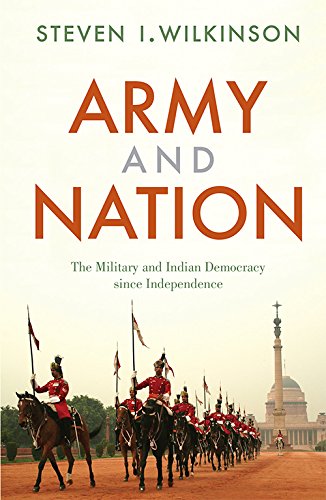

ARMY AND NATION (PB)
A**C
Excellent Book, must read
It is a nice book ,well written it deals with the history of Indian Army from the British raj to post British, gives an interesting facts, clears misconceptions and gives interesting accounts of how Army was viewed by the Indian Goverment , comes with fairly good amount of data and statistics.
S**O
Untold story on Indian army
Wilkinson has gathered lots of material and narrated untold stories on the Indian army. It is indeed a good document and will encourage many future researchers to add further to it. The only complaint that I have is that the book was not edited properly for making it easy reading for the average readers. The language often enough is jerky. However the blame should go to the editor and publisher. The author has done a commendable job. The interesting anecdote on how Indira and her son Sanjay Gandhi attempted to persuade Gen Raina the Army Chief to seize control of the government after the 1977 election defeat. Strange that Indian media loved to ignore this information.
S**S
true eye opener
is a amazing book
A**A
Review
Loved it
A**R
Nehru n his vision
Well written book supported with researched data. Worth reading 2 understand why Indian Army is different than other Asian Armies..
P**I
good read.. :)
Good book. worth a read for all military aspirants.
A**D
Five Stars
Fantastic
A**R
Five Stars
good
R**R
Excellent book but could this have been a paper ?
Professor Wilkinson has written a worthwhile book answering an excellent question with a well argued, insightful answer.The question - with the same legacy as the coup happy Pakistani Army, why has the Indian Army not intervened politically since Indian independence and let Democracy survive?And Professor Wilkinson sharpens the question itself. He points out that the first batch of Indian officers in the British Indian Army - Hindu and Muslim - did share the same mindset due to the selectivity of their situation (so few were the chosen few Indian officers before WW II) and the shared time spent at Sandhurst and later. Ayub he points out, and he is able to back this up through incidents was not that different in mindset from a Cariappa or Thimayya.The author then offers three central arguments as the answer to this question:I. The different inheritance, particularly driven by the ethnic composition of the British Indian Army - a Punjabi majority force, which became far less Punjabi dominated for India and much more so for Pakistan, after partition. And this sort of situation, the author points out, leads to a certain ethnic elitism which ultimately led to a coup in many countriesIII. The political strength of the Congress, a highly representative body with a 90 year history vs. the Muslim League, which was a ragtag elitist force which had grown massively 10 years before partition. The Congress' representative character, in turn led to some excellent politically stabilizing decisions such as the formation of linguistic provinces and the decision not to impose Hindi - decisions that could only have come bottom up from a representative organization such as the Congress, unlike the top-driven Muslim League which told the Bengalis to 'stuff it' and accept Urdu as the sole national language, a highly destabilizing decisionIII. Coup proofing measures in the 1950s by Nehru, Patel and the first few defense secretaries - creating a parallel defense ministry bureaucracy to control army finances, taking the army chief out of the cabinet unlike the British times, splitting the Chief position by service, downgrading pay and perks, spying on senior army leaders etc.So now shorn of some detail I have told you what the book is all about. Is it impressive ? Yes it is and for a variety of reasons - this subject is not as well studied, the supporting data has been painstakingly gathered, and is not easy to come by and generally the author has good overall perspective.Here's the real question - could this be a paper instead of a book?Well, there is certainly a lot of repetition chapter after chapter and much of the data and charts actually communicate the same message. I feel that in the next edition, perhaps this could become a 'really good book' but it's not there yet else I would not be the third person reviewing this on Amazon.com.The quantitative part and rigor is there, even the story flow exists, but the 'spice' is missing. It has some to be sure - generals meeting in houseboats on Lake Nagin to escape Intelligence Bureau 'tails'. Would gently recommend to the author that if he were to ever invest the time to write a second edition, he could cut some of the repetition out and replace it with this sort of spice.If you want a non hard core historian readership, take inspiration from the Bollywood Masala movie please ! There are a lot of Indians who would pay up to read about their much moved but little understood army.
R**Y
Why has India not had any Military Coup while Pakistan has had Many?
An excellent explanation for the complete absence of any military coup in India since independence despite widespread poverty, illiteracy and corruption. Almost all other developing countries experienced some interval of authoritarian rule. India is a complete outlier. This bok does an excellent job of explaining the reasons for the continuing vibrancy of India's democracy.
A**E
Estimable analysis of political and military interactions in India
One of the best studies of the relations between civilian and military in India. Provides reader with social, economic, and political background to understand the significance of policies adopted, and their impact.
R**H
Good perspective of the history of civil - military relations
Well written but there was an opportunity for making it more concise. Good reading for getting the perspective on the subject.
Trustpilot
2 days ago
2 months ago